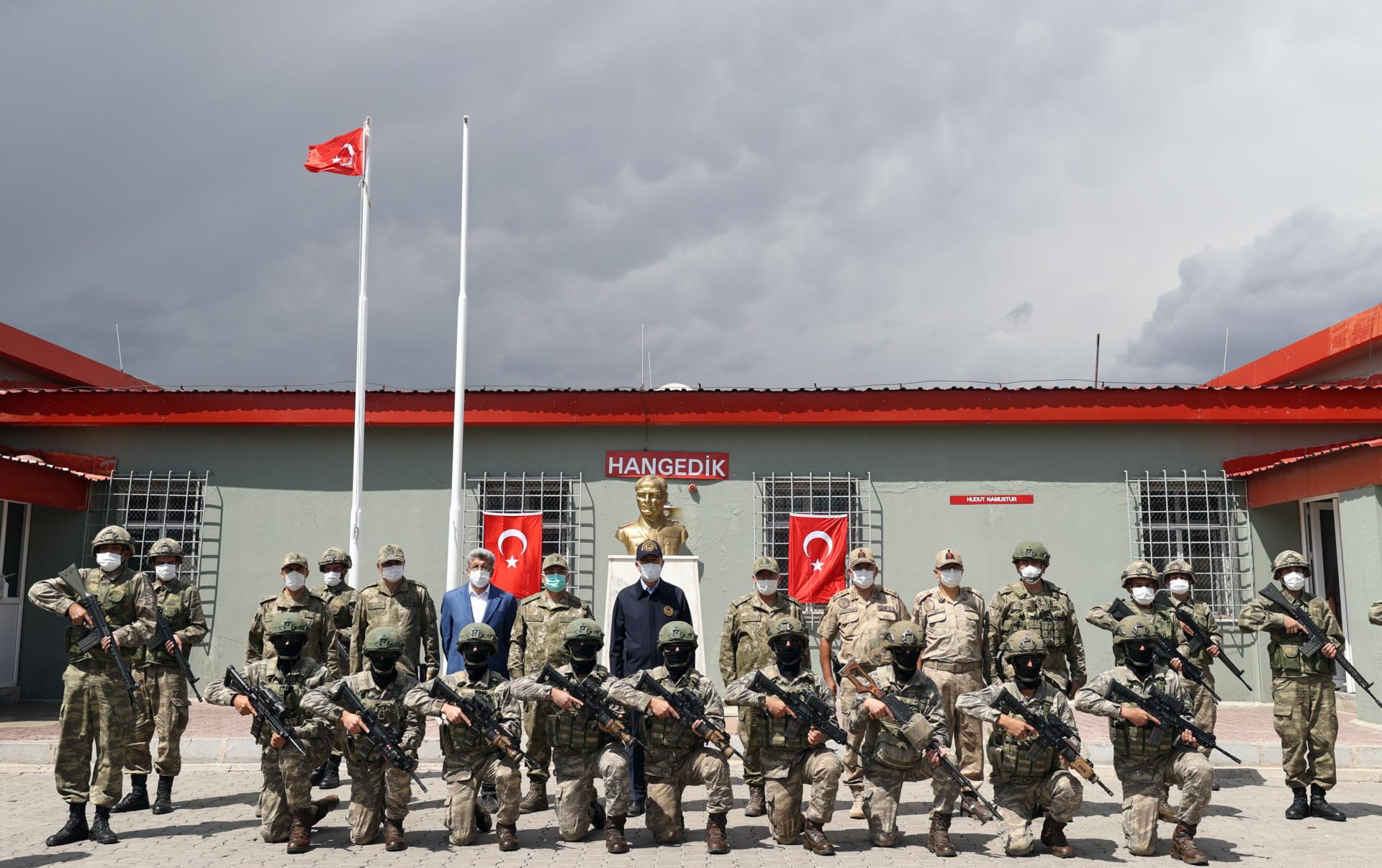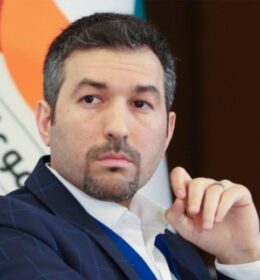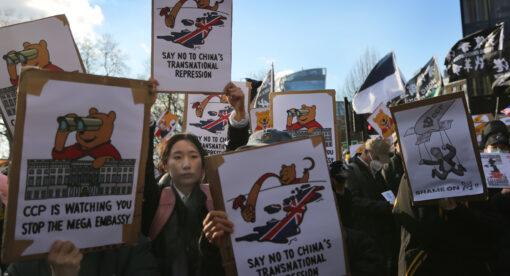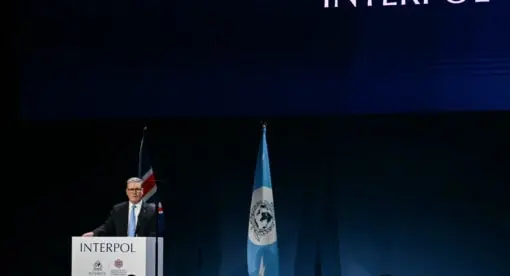Until recently, Turkey has relied on trade and diplomacy, as well as its key geographic location between Europe and the Middle East, to project power. But amid a decade of volatility brought on by the Arab Spring uprisings of 2011, Ankara has shifted to a hard-power approach to secure itself from threats in and achieve its aspirations of becoming a regional power.
Turkey’s complex geographic position — between Europe and Asia, the Black Sea and the Mediterranean — puts it at the center of a geopolitical environment tied to several different geographical, political, and cultural landscapes. This complexity has tremendous impact on the country’s internal, foreign, and defense policies and makes Ankara sensitive to emerging security threats in its neighborhood.
Conventional wisdom is that geography privileged Turkey to be a genuine bridge between the East and West, but often overlooked is the fact that that same geography exposes Turkey to numerous unique challenges and threats, which has elevated territorial integrity, security, and interests to a central position in the thinking of the Turkish political, security, and defense establishment. These challenges have compelled Turkey to adopt a strong state model, increasing its hard-power projection to meet them.
Foreign discourse on Turkey often alienates such considerations, which creates a gap not only in terms of understanding what Turkey is doing or trying to do but also, most importantly, why it is doing it and what its end goals are.
Shifting from Soft Power to Hard
During the first decade of the 21st century, the ruling Justice and Development Party (AKP) managed to chart a middle path for itself away from both the traditional radical secularism enforced by military rule and strident religious dogmatism. Its efforts to harmonize democracy, secularism, and Islam drew great attention to a rising modern nation with a liberal economy. At the time, its experience constituted a “model” and generated enormous soft-power capacity. This soft power rested on three primary pillars:
- Democratization experience and reforms
- Substantial and sustained economic growth of a rising trade state
- Visionary, engaging, and proactive foreign policy (the so-called “zero problems” policy, high-level political dialogue, economic integration and interdependence, security for all, multicultural coexistence)
As a result, Turkey managed to establish and assert its soft power, deploying it effectively in its regional environment and beyond. This soft power sought to inspire people of the region and thus was one of the main factors that shaped the ambitions and aspirations of the uprisings that began in 2010. But those same revolutions drastically changed the regional security environment for Turkey, posing serious threats to Ankara on a scale that had not been witnessed in recent memory.
When the Syrian revolution erupted on March 11, 2011, Turkey’s foreign minister at the time, Ahmet Davutoğlu, spent months trying to convince Syrian President Bashar al-Assad to stop using unjustified overwhelming force against peaceful protesters and alter his course in return for Turkish support for reforms in Syria. Al-Assad instead turned his ear to Iran, leaving decision makers in Ankara to have intensive discussions on what to do next. The majority opinion was that Ankara could still depend on its vast soft-power reservoir to influence events beyond its borders and reshape the region in a way that would help advance democracy and genuine stability, which would ultimately serve Ankara’s interests.

The main goal of Damascus was to deter Ankara. When the Assad regime decided to withdraw its regular forces from areas of Northern Syria, it enabled the Kurdish Democratic Political Union party to fill the vacuum and create a buffer zone between Syria and Turkey. As a result, the discussions within Turkey shifted to whether it should militarily intervene given the rise of the activities of the Kurdistan Workers’ Party (PKK) in that region and the threat it posed to Turkey’s national security as a designated terrorist organization. The political and military establishment resisted the idea of using Turkey’s hard power, but the decision to put Turkey on defense allowed enemies, rivals, and even allies to intervene and shape events in a way that Ankara believed disregarded its interests and posed a serious threat to its national security.
Iran’s military support to the Assad regime prolonged, sectarianized, and radicalized the conflict and turned Syria into a failed state, thus posing various security threats to Turkey. Meanwhile, then-U.S. President Barack Obama’s failure to enforce his famous red lines to appease Iran on the nuclear deal and strike a deal with Russia on al-Assad’s chemical weapons consolidated the pro-Assad, anti-Turkey bloc in Syria. Furthermore, the alliance between the U.S. administration and Kurdish militias in Syria alarmed Ankara and raised fears of a spillover of the possible disintegration of Syria and separatist ambitions. The Russian military intervention in 2015 prevented the Assad regime from falling, reversed the tide of the revolution, and reshaped the power balance of the struggle in a way that made it even harder for Turkey to pursue its interests in Syria.
In 2013, an Egyptian coup d’état that ended with the ouster of President Mohammed Morsi – who had a positive relationship with Turkey – altered the geopolitical balance in the region. At the end of 2014, geopolitical transformations led to the emergence of three regional blocs. The first includes Saudi Arabia, the United Arab Emirates, and Egypt; the second encompasses Iran and its pro-Islamic Revolutionary Guard Corps (IRGC) Shiite regional proxies along with governments of Iraq and Syria; and the third comprises Turkey and Qatar. The last bloc experienced pressure from two critical developments in 2015: a military intervention by Russia in Syria and the U.S.-Iran nuclear agreement, both of which Turkey perceived as ways to empower its neighbor and historic rival, Iran.
After a 2015 incident where a Turkish F-16 downed a Russian Su-24 jet over airspace violation claims on the Turkey-Syria border, the situation in Syria turned into a struggle of wills and hard power. While NATO released statements of support for Ankara and called for de-escalation, Turkey felt the alliance’s inaction was a sign of abandonment by its NATO allies and Western partners. This convinced some Turkish officials that overdependence on soft power and reliance on foreign partners and allies undermined Turkey’s security interests and constrained its ability to be proactive. Its exclusive dependence on soft power in a defensive orientation and the reliance on others to cooperate regionally proved costly.

In 2015 and 2016, the risks posed by the rise of cross-border terrorism carried out mainly by PKK affiliates and the Islamic State group on the Turkish home front increased dramatically. This was accompanied by serious concerns regarding the possibility of increased instability in Ankara’s surroundings as a result of neighboring countries collapsing into failed states, as well as the perceived threat that a security vacuum would spill across the Turkish border from Syria and Iraq.
How Turkey Uses its Hard Power
The shift in the decision-making process toward depending on hard power occurred when then-Prime Minister Recep Tayyip Erdoğan won the August 2014 presidential election. Subsequently, the political establishment became interested in shifting to hard power.
Since Turkey was already the second-largest army in NATO after the U.S. armed forces, the strongest military in the Middle East, and the largest economy in the region, materializing the country’s hard power did not take much time. The regional vacuum, the rise of radicalism and terrorism, the interference of foreign powers, and the need to tackle the rising hybrid threats and protect Turkey’s interests all provided Ankara with the needed reasons to put hard power into action. The Turkish activism in this sense rested mainly on four pillars:
- A presidential system with sweeping executive powers and a centralized decision-making process
- A homegrown defense industry increasingly meeting the needs of the armed forces locally
- A goal of strategic autonomy as an aspiring middle power and great regional power
- A professional army with long-standing experience in fighting multi-front hybrid wars
The rise of Turkey’s hard power gave birth to assertive foreign, defense, and security doctrines and policies. The hard power Turkey began to use manifested in several forms, including extraterritorial military operations, military deployments on foreign soil, forward military bases, and displaying its land, sea, and air strength in several regional theaters in the Levant, Gulf, Horn of Africa, North Africa, Eastern Mediterranean, and South Caucasus.

Extraterritorial Military Operations
Turkey began using military force in northern Syria in August 2016, more than five years after the beginning of the revolution. It launched a military operation dubbed Euphrates Shield, followed by Operation Olive Branch in January 2018, in which it deployed military forces deep into northern Syria to establish a Turkish-controlled safe zone in the north along the Syrian-Turkish border to both counter Kurdish insurgents Turkey deemed affiliated with the PKK and the Islamic State group as well as to deter the Assad regime, Iran, and Russia from encroachment.
In parallel with these operations, Turkey established military points and bases in northern Iraq and launched Operation Claw in May 2019. Months later, Ankara launched its third military operation, Peace Spring, in Syria, followed by Operation Spring Shield in February 2020 against the Assad regime and the pro-Iran allied militias in Idlib.
These military operations had five primary objectives:
- Safeguarding Turkey’s homeland from cross-border terrorist operations
- Creating a safe zone to protect the civilians and prevent a further influx of refugees into Turkey, which is already home to world’s largest refugee population according to UNHCR
- Stabilizing security in border areas
- Preserving the unity of Syria and Iraq
- Pushing back against Assad regime backers – namely Iran and Russia) – and putting pressure on Assad regime to ultimately achieve a political transition

Today, Turkey has around 114 military posts in Syria, with the majority concentrated in Aleppo and Idlib provinces where Assad regime forces, along with Iran’s IRGC and its affiliated Shiite militias, especially Hezbollah, have been amassing for a while. Operation Shield in particular was critical in terms of deterring regime- and Iran-backed militias from causing a massive refugee influx of more than 3 million Syrians living in Idlib toward Turkey and Europe.
Turkey has around 37 military posts in northern Iraq, including a military compound in Bashiqa, military training facilities to train Iraqi/Kurdish Peshmerga forces, and posts for its National Intelligence Organization (MIT). The majority are in the border regions connecting Turkey to Syria, Iraq, and Iran, but there also are posts in Erbil, Duhok, Soran, and Zakho.
Notably, the IRGC-backed Shiite militias in Iraq have been increasing the pressure on Turkey and its troops there under Operation Claw by implicitly aligning with the PKK and threatening to attack Turkish posts in Northern Iraq amid what they consider “a far more dangerous presence compared to the U.S. presence in Iraq.”

Forward Bases
In 2014, 2015, 2017, and 2019, Turkey signed multiple defense agreements with Qatar, Somalia, Sudan, and Libya. These agreements paved the way for Ankara to establish its first military bases in the Middle East, the Gulf, and the Horn of Africa with a possibility of opening additional bases on the Red Sea and the Mediterranean in North Africa.
These forward military bases offer several advantages to Ankara, the most important of which are:
- Enhanced unique capabilities to respond to contingencies through forward deterrence and support measures
- Advanced opportunities for strong security cooperation with regional actors
- Defense capacity building within bilateral and multilateral partnerships
- Geostrategic posturing and effective political messaging
- Self-promoting of high professionalism, domestic defense capabilities, and alliance credibility
- Several tactical and strategic objectives depending on the type of the base and/or mission including stabilizing the region
When the 2017 GCC crisis erupted, with the perception that the UAE and Saudi Arabia were reportedly intending to encroach upon Qatar, Turkey swiftly deployed some of its armed forces units to Tariq Bin Ziyad military base in Doha in accordance with the 2014 defense agreement between the two capitals. Although the number of troops was small, Turkey sought to send a strong message to Qatar’s GCC counterparts to prevent a military escalation of the crisis.
The GCC crisis enabled Turkey’s hard power to return to the Gulf after almost 100 years and to play a role in the Gulf region for the first time since the collapse of the Ottoman Empire. Two years later, Qatar and Turkey officially inaugurated the headquarters of the Qatari-Turkish Joint Command at Khalid Bin Al Walid Military Camp.
In 2017, Turkey secured a foothold in the Horn of Africa when it inaugurated its largest overseas military training academy in Somalia (Camp TURKSOM). For years, Ankara has been involved in a lone nation-building effort in Somalia, with one objective being to build a strong and professional Somali armed forces to counter terrorism and achieve stability and security in the country. So far, Ankara has trained more than 2,500 Somali soldiers and more than 1,600 police officers.
Additionally, Ankara is involved in providing military training for several countries including Libya and Iraq. Turkey has provided training and support for the Iraqi troops and the Kurdish Peshmerga against the Islamic State since 2015 through its base in Bashiqa, northern Iraq, to protect its interests and gain a foothold in countering the PKK.
In Libya, the 2019 defense agreement between Turkey and the U.N.-recognized Government of National Accord granted Ankara extended influence in the oil-rich North African country. With Libya lacking modern professional army and institutions, the Turkish Armed Forces provided military training, aid, and consultancy for the country’s defense and interior ministry institutions. Within a year, Turkey had trained more than 2,500 Libyan personnel on the use of air defense systems, mortars, and the annihilation of mines and improvised explosives. Additionally, Turkey trained Libyan personnel on coast guard, base defense, and special operations.

Turkey also has been eyeing a possible naval base at Sawakin Island in Sudan. The island was at one point an important naval station in the Ottoman geography to secure the Hejaz region (Currently in Saudi Arabia) against raids coming from the Red Sea. Sawakin occupies a strategic position opposite Saudi Arabia across the Red Sea and Egypt to the north, which places Turkey in areas of strategic competition with regional powers.
There also have been reports on Ankara’s intention to establish a naval base at Misuratah and an airbase in al-Watiyyeh in Libya and naval bases in the Black Sea and in Cyprus. Ankara already has deployed its domestic unmanned combat aerial vehicles (UCAVs) in Northern Cyprus and is planning to deploy them on its floating base soon to be in service, the TCG Anadolu Light Aircraft Carrier.
In this sense, Turkey has been deploying its hard power not only to achieve defense and security objectives but also to fulfil political outcomes, with the intent of projecting a message of credibility and commitment to its allies in a volatile region.
Assertive Naval Doctrine in the Eastern Mediterranean
The Mavi Vatan, or “Blue Homeland” naval doctrine reflects Turkey’s growing maritime assertiveness. It responds not only to the political shift in the doctrinal orientation within the Turkish political-military establishment but also to the changing dynamics in the region after the Arab revolutions. It calls for turning Ankara into a maritime power and emphasizes the importance of Turkey becoming less dependent of foreign powers and more self-reliant in terms of projecting power in its immediate surroundings through proactive rather than reactionary measures

The doctrine suggests that Ankara must protect and defend its maritime borders, maritime rights, and national interests in three seas the Black Sea, the Aegean Sea, and the Eastern Mediterranean depending on political, legal, and hard-power tools, including a growing naval power and maritime energy fleet.
The doctrine is mainly linked to two former Turkish rear admirals: Cihat Yayci and Cem Gürdeniz. Gürdeniz served as the chief of strategy department and head of plans and policy division in the Turkish Naval Forces Headquarters and was once imprisoned due to alleged links to the “Ergenekon” network that sought to overthrow the AKP government. He is credited for coining the term “Mavi Vatan” and contributing to the development of the doctrine.

Yayci is a professor who has written extensively on maritime law and is thought of as the architect of the 2019 Turkey-Libya delimitation agreement. He is a strong advocate of the Blue Homeland doctrine and helped develop it on military-legal levels.
In contrast with previous foreign policy doctrine, Mavi Vatan is primarily anchored on Turkey’s hard power and more compatible with Ankara’s assertive foreign policy and defense activism in the post-Arab revolutions era.
The doctrine has attracted attention lately for several reasons:
- Turkey’s increasing dependence on maritime trade, with around 87% of its foreign trade carried out by sea
- Regional chaos and security vacuums threatening Turkey’s national security and critical interests
- The feeling that Ankara has been strongly pressured by the French-backed emerging alliance between Greece, Cyrus, Egypt, and Israel to accept its Exclusive Economic Zone (EEZ) being minimized to Antalya Bay
- Other regional actors’ accelerated race to invest in exploiting underwater resources and riches in the Eastern Mediterranean
Dr. Ali Bakir is a Research Assistant Professor in Ibn Khaldon Center for Humanities and Social Sciences at Qatar University. Dr. Bakir is also a senior consultant and an analyst who specializes in geopolitical and security trends in the Middle East with a particular focus on Turkey’s foreign and defense policies, Turkey-Arab relations, foreign policies of GCC countries and Iran, great power politics, small states’ behavior, and emerging unconventional risks and threats. Bakir has over a decade of experience as a consultant – working with senior officials, decision makers, and other stakeholders for governmental, non-governmental, and private sector institutions across the region.
The views expressed in this article are those of the authors and not an official policy or position of the Newlines Institute.






